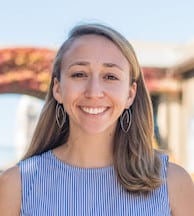The startup roundup series spotlights students and recent alumni who are starting a new business or enterprise.
LiftEd
Co-founders: Andrew Hill MBA 16, CEO
Joanne Hill-Powell, chief data scientist
Many hospitals and clinics have turned to technology to better track their patients, using central records that detail medical histories, current prescriptions, and health goals. Andrew Hill, MBA 16 and co-founder of startup LiftEd, wondered why students receiving special-education services couldn’t benefit from a similar system.

After all, Hill’s sister, Joanne Hill-Powell, a special-education teacher and behavior analyst for more than 10 years, was spending countless hours a week tracking her students’ learning interventions, and preparing for meetings with administrators and parents. “The volume of data required to continuously monitor a student’s progress—a legal mandate for students with learning disabilities in the U.S.— is often scattered among binders, and stored in filing cabinets, on sticky notes, in emails, and in the cloud,” Andrew Hill says. “It gets complicated pretty quickly.”
Observing special-education classrooms during the summer of 2014—and getting a broader understanding of how hard it is for those teachers to track data—led Hill to found LiftEd with his sister. He combined his experience as a technology consultant and user experience designer with Hill-Powell’s doctoral-level training and extensive career working with students with various learning disabilities who range in age from three to 22.
The startup offers a mobile platform that educators and other special-education professionals use to monitor students’ progress on annual academic, functional, social, and behavioral skills goals. But perhaps even more importantly, LiftEd can be used to turn student data into digestible progress reports and data-driven charts that provide a window into a student’s learning. That allows educators to make better real-time decisions on the level of instructional support a student needs, says Hill.
In the current school year, LiftEd is on track to be used in 20 school districts, up from 10 last academic year. And by the 2019-2020 school year, Hill expects the system to be used in over 100 districts, under pay-per-student subscriptions.
LiftEd has raised more than $800,000 and is currently on the verge of closing a seed funding round, says Hill, who was named to the “Forbes 30 under 30” list for education this year.
At Haas, Hill says marketing lecturer Wasim Azhar and Assoc. Prof. Adair Morse, who teaches New Venture Finance, as well as Asst. Prof. Juliana Schroeder and Assoc. Prof. Sameer Srivastava, were all incredibly helpful, along with the Berkeley Haas Entrepreneurship Program executive director, Rhonda Shrader, and entrepreneurship lecturer, Jorge Calderon.
Hill says the company has proven, through a third-party study, that LiftEd saves educators time, on average 10 or more hours per week. The platform is also accelerating the rate that students master individualized educational goals, and is empowering educators to better prioritize student instructional needs, Hill says. “We had a teacher tell her district’s special-education director that she’d rather give up a kidney than not have LiftEd again this year,” Hill says. “So, I think we’re onto something.”
 81cents
81cents
Founder: Jordan Sale, MBA 19
At age 21, Jordan Sale, MBA 19, was excited to land an unpaid internship at a Washington, DC-based communications agency. At the advice of her uncle, Sale worked hard to put together a case for why she deserved a stipend for living expenses. While her employer didn’t giver her that stipend, the agency did agree to a transportation stipend.

“Every time I took the subway that summer I was so happy,” says Sale. “This made me understand first-hand the importance of negotiating—despite not doing very well at this one.”
Eight years later, Sale is advising other women about compensation, whether they’re negotiating a starting salary or seeking a raise at a current job. Her startup, 81cents, a name that refers to the amount a woman earns on average for every dollar a man earns, aims to help women avoid the so-called wage gap. While Sale acknowledges that there are systemic reasons for the wage gap, she says that men initiate negotiations four times as frequently as women, often landing better results. “It struck me that this is something that’s pervasive,” she says. “Negotiating works and it’s something tangible that women can start to do right now to initiate change for us.”
81cents reviews compensation packages and helps clients plan their negotiating strategy, even running mock negotiations. Clients have the option to pay an hourly fee of $81 or a total of $425 for unlimited help. The company also offers lower cost “crowdsourced offer reviews,” in which it circulates a client’s offer, minus identifying information, among its network of recruiters and hiring managers who provide feedback in the form of a personalized report.
Sale says her experience in a leadership role in Berkeley’s LAUNCH Accelerator program was invaluable in teaching her about the early days of building a company. Rhonda Shrader, executive director of the Berkeley Haas Entrepreneurship Program, and Profs. Omri Even-Tov and Juliana Schroeder have all helped her navigate the launch, she says.
Schroeder provided an hour-long primer on salary negotiations and serves as a resource on how to tackle challenging negotiations. Even-Tov, who is an entrepreneur, “has been a helpful mentor in navigating some of the classic challenges all early-stage businesses face, such as when to incorporate and how to think about equity,” she says.
Grants and fellowships have allowed Sale along the way. In addition to the $12,500 Larson Scholarship for Entrepreneurship, she also received a $5,000 Hansoo Lee Fellowship, a $5,000 Dean’s Seed Fund (now the Trione Student Venture Fund) grant, and a $5,000 Martin Fellowship. To move the company forward, she partnered with UC Berkeley students Nikita Jain and Grace Lin over the summer.
So far, 81cents has worked with about 65 clients. “When I hear back from a woman who’s had a successful negotiation, it’s incredibly meaningful, and motivates me to keep pushing” Sale says.

Nearfarms
Co-founders:
Shom Gupta, MBA 19
Surya Sendyl, MIMS 19

Shopping at a local farmers’ market can be fun—all those fresh organic strawberries and bunches of baby kale for the picking. Trouble is, some people just don’t have the time to go.
With his startup, nearfarms, Shom Gupta MBA 19, is bringing the farmers’ market online, where customers can order from local farms without going to the market. “This area has such a rich agricultural bounty and I wanted to tap into the local agricultural system,” says Gupta, a loyal farmers’ market shopper and self-described foodie. “Nearfarms is about making fresh, local produce easy and accessible.”
Gupta co-founded the startup with Surya Sendyl, a student in the MIMS (Master of Information Management and Systems program) at UC Berkeley.
Selection varies, and often follows the seasons. In October, the nearfarms website featured produce from the downtown Berkeley farmers’ market, including organic pasture-raised eggs from Riverdog Farm in Guinda, Ca., empire, honey crisp and gala apples from Billy Bob Orchards in Watsonville, Ca., and cauliflower from Happy Boy Farms in Soquel, Ca.
Gupta and Sendyl pick up their customers’ online orders at the local farmers’ markets, where they sort and pack the food for home delivery. The company currently delivers, using freelance drivers who ferry packages, typically on Saturdays, to Oakland and Berkeley. The startup will slowly work to expand its delivery area, says Gupta, who previously worked at New York online grocer FreshDirect.
At Haas, Gupta received a grant from the Dean’s Seed Fund, now called The Trione Student Venture Fund, to start his venture. He also credits the Berkeley LAUNCH Accelerator program with jumpstarting his startup by teaching him about business models and connecting him to his mentor, John Mattheson, an urban farmer with Rodgers Ranch Urban Farm in Pleasant Hill, Ca.
Gupta acknowledges that nearfarms’s current business model may work only in areas with a high concentration of small farms, farmers’ markets, and consumers who care about how and where they buy their food.
And expanding to a completely new region would mean starting anew with recruiting farmers, since the company’s existing relationships with local farmers wouldn’t carry over to anywhere else. “But we’re comfortable with that,” Gupta says. “If we can nail down the Bay Area and be good at it, we’d be very satisfied.”
